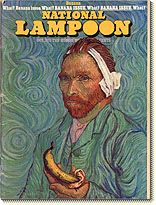 Sparky: I may not care a rat's ass about Joe the Plumber - but we should all care about G. Gordon Liddy — one of Nixon's plumbers.
Sparky: I may not care a rat's ass about Joe the Plumber - but we should all care about G. Gordon Liddy — one of Nixon's plumbers.I am old enough to remember the Banana Issue of National Lampoon which parodied Nick Fury - Agent of SHIELD with Liddy as the Agent of CREEP (Nixon's Committee to Re-Elect the President). And "ACE" McCain is a pal of Liddy. And that's real creepy. REALLY FUCKING CREEPY.
Barry Eisler observed:
“... As I mentioned above, polls show that McCain's negativity is killing him. So either his people are in denial about what the polls show, or McCain simply can't help himself. Neither explanation makes me comfortable with the notion of a President McCain. Do you want in the Oval Office someone in denial, surrounded by others in denial (does that sound a bit... deja vu?). Do you want someone who can't stop himself from engaging in behavior that he knows is bad for him, who has that little control over himself? I don't.
At one point, Obama said the health of the economy is critical because never in history has there been a country whose economy declined and who maintained its military primacy. Fair enough, but I find troubling the notion that our economic health is important primarily because we need a healthy economy to retain military superiority. Surely there are more important reasons for a healthy economy than the maintenance of military strength? On the issue of Imperial America, Obama doesn't strike me as about Change at all.
Part of what consistently hurts McCain in these campaigns is how obviously nervous he is. Look how much he blinks. Blinking is a classic sign of nervousness, and is also associated with lying. Whether viewers are consciously aware of it or not, over the course of three debates and innumerable interviews, McCain comes across as either afraid of Obama or deceptive or both. Neither quality is something many people want to see in a president. ...
HUFFPOCO: Sam Stein: McCain Defends His Own Association With Unrepentant Criminal: It's Ok, He Went To Jail
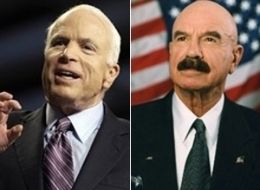
After weeks of hammering Barack Obama for having an association with a former Weather Undergound member, John McCain was asked Thursday afternoon about his own connections to a past felon: G. Gordon Liddy.
The question came, of all places, from late night comedian David Letterman, who pressed the Senator to explain why he was friendly with the man who was convicted in the Watergate scandal of conspiracy, burglary, and illegal wiretapping. McCain - according to an advanced report of the show - initially said that he "met" Liddy before adding, "He paid his debt, he went to prison, he paid his debt."
Later in the segment, McCain praised Liddy's "adherence to the principles and philosophies that keep our nation great," said he was "proud" of Liddy, before chiding Letterman: "it's always a pleasure for me to come on your program."
And yet, important to note in all of this, is that Liddy has been publicly unrepentant for his actions, much like Ayers. In an interview with the UK Independent Liddy said he didn't regret burglarizing the offices of the Democratic National Committee.
In addition to the burglary - for which he served a four-and-a-half year sentence - Liddy broke into the office of Daniel Ellsberg, the military analyst who leaked the Pentagon Papers. He also admitted to plotting both the murder of journalist Jack Anderson - a harsh Nixon critic - and the firebombing of the Brookings Institute.
The parallels between Ayers in Liddy are stretched in the regard that Ayers was part of a group that did undertake bombings (though all of them were designed to avoid casualties). But McCain seems to be suggesting that an association is legitimate if the individual served a jail sentence, something Ayers, too, would have done had the FBI not mangled its investigation.
Liddy's relationship to McCain has ventured somewhere between the personal and political. Liddy donated $1,000 to the Senator's presidential campaign and has hosted him on his radio program. Media Matters for America reports that Liddy once described McCain as an "old friend."
In addition to addressing Liddy - for what seems the first time in this campaign - McCain was asked by Letterman if his running mate had really said that Barack Obama "pals around with terrorists." McCain, according to a write up of the appearance, "started to say he didn't know, then said 'Yes. And he did.'"
That line has been the subject of much debate over the past week, with Palin actually removing it from her stump speech after Republicans and Democrats alike criticized her for inciting already rabid crowds. McCain, during the debate on Wednesday night, also sought to downplay that angle, saying the issue with Ayers was not one of terrorism, but rather whether Obama was being fully truthful with voters.
Strange McCain Post-Debate Moment Caught In Photo

Secret Service Blocking Reporters At Palin Rallies: Milbank
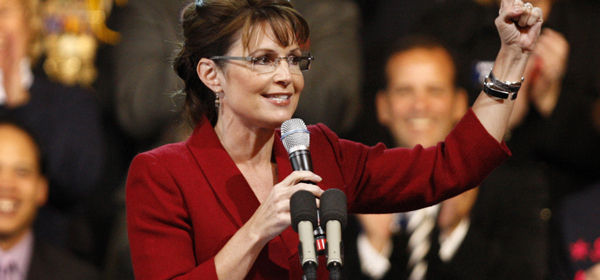
Via Romenesko, the Washington Post's Dana Milbank reveals in an online chat that the Secret Service is stopping people reporters from interviewing people at Palin rallies:
Arlington, Va.: The Secret Service has now labeled the "kill him" report as unfounded. Why isn't The Post giving this report as much coverage as the original false report received?
Dana Milbank:Glad you asked, because I saw this earlier. This is actually about the incident in Scranton, not the one in Clearwater, Fla, that I wrote about here.
I wasn't at the Scranton event, but I have to say the Secret Service is in dangerous territory here. In cooperation with the Palin campaign, they've started preventing reporters from leaving the press section to interview people in the crowd. This is a serious violation of their duty -- protecting the protectee -- and gets into assisting with the political aspirations of the candidate. It also often makes it impossible for reporters to get into the crowd to question the people who say vulgar things. So they prevent reporters from getting near the people doing the shouting, then claim it's unfounded because the reporters can't get close enough to identify the person.
HUFFPOCO: RJ Eskow: Is There a GOP Strategy -- A Kamikaze Campaign for the Black Helicopter Crowd?
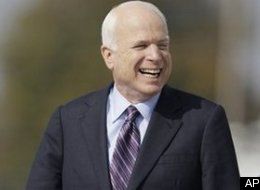
Strange. On the same day that a new poll showed McCain's negative campaign is damaging his chances, he used the final debate to go even more negative. And McCain and Palin are both going deeper into black-helicopter territory, with talk of "terrorists" and a scary organization they say is going to steal the election.
An observer could be forgiven for thinking that they're not even trying to win anymore -- that they have another agenda in mind. Let's hope that interpretation's wrong. The politics of destruction has already hurt the country enough.
The television pundits initially thought McCain did well last night, but polls confirmed that most Americans knew better: The number of Americans who thought Obama won jumped to 53% in the CBS poll, up from 38% and 40% in the first two debates.
Sure, McCain was livelier , and he didn't wander aimlessly around the stage. Apparently commentators confused his improved vital signs for a more effective performance, but here's what really happened: McCain had already convinced most Americans he's not capable of fixing the economy, but last night he convinced them that... they don't like him, either. Whaddya expect? They told him through the polls that they don't like the meanness -- and in response he got meaner.
The question is: Why? Why would a faltering campaign double-up on a losing strategy? Sure, there's always the possibility that McCain can't help himself, that he's so full of anger and bitterness that he can't control himself. Or there's the possibility is that the Palinites have taken over the campaign, forcing McCain to do their bidding. ("Lassie, go tell Mom and Dad! The bad people have taken Grandpa!")
But there's a simpler explanation for all the wacky conspiracy theories and incitements to right-wing rage: This could be a long term "destabilization" strategy. They expect to lose. So they'd rather lose by an even larger margin, but in a way that encourages their base to question the legitimacy of Obama's administration. McCain's behavior actually makes sense in that light - if their goal isn't to win, but to lay the groundwork for noncooperation (if not active resistance) to the Federal government.
That's not an opposition-party strategy. It's political Posse Comitatus.
Before you decide they'd never be that extreme, remember: That's pretty much what they did during the Clinton years -- with the murder theories, false conspiracy stories, and deeds like Newt Gingrich shutting down the government. It was a watered-down version of the destabilization campaigns the U.S. has used against unfriendly foreign governments for decades.
A real destabilization strategy needs people who will hold demonstrations and perform other acts of protest (which aren't always peaceful). It doesn't take very many. The women banging pots and pans in Chile were few in number, but their psychological impact was great. What was important was that they were angry.
Think about it: When given yet another chance to condemn people at Palin rallies for shouting "terrorist" and "kill him," McCain refused. He danced around the question by saying you'll "always have fringe people" who say things that "aren't appropriate." But he insisted "I'm proud of the people that come to our rallies." He didn't say "that kind of talk is out of line," and - pointedly -- Sarah Palin's never said it either.
So here's the pattern: Paint Obama as an extremist, a terrorist plant. Stir up hatred. Lay the groundwork for arguing that the election was stolen, even if you're veering into conspiracy talk. You're firing up the same crowd that thinks George Bush Sr. and the Trilateral Commission created a secret world dictatorship enforced by UN agents in a fleet of black helicopters.
McCain addressed that crowd in a couple of other ways, too. He used coded language for the far right home schooling lobby, for example, when he said school choice is "the civil rights issue of the 21st Century." And then there's this unforgettable line:
That's the extreme pro-abortion position: "Health."There are good people on both sides of the school choice and reproductive rights issues, but when you use an activist catch-phrase ("schooling as THE civil rights issue") and mock women's health, you're simply playing to the extremists in your base.
If the goal really is to stir up resistance, the anti-Clinton harrassment of the 1990's will seem tame in comparison to what's coming. But it could backfire, too. The GOP's Achilles heel (that means "weakness," Gov. Palin) is its tendency to keep using once-successful strategies long after their sell-by date. Americans could easily become infuriated if they come to believe one party is sabotaging the other at the expense of the public's well-being.
That may be why so many responsible conservatives like George F. Will (and less responsible ones, too) are condemning this campaign. Conservatism was a fringe ideology for decades, until William F. Buckley and Barry Goldwater restored its respectability. An extremist "guerrilla resistance GOP" could set the conservative cause back for decades.
Obama isn't President yet, and Democrats would be foolish to be too sanguine about the outcome. And God knows I hope this interpretation of the GOP's strategy is wrong. We need to restore a responsible public debate and put an end to the destructiveness of the last 15 years. If Obama is elected and Republicans opt for a "destabilization" strategy, everybody will lose.
_____________
(UPDATE: John Amato reports that Rush Limbaugh's becoming even loopier, talking of black people with a "30 year plan" to turn their children into militants. Rush then links this conspiracy to Rev. Wright, ACORN, and terrorism. It's all of a piece with the new trend of turning right-wing politics into a war game. It's conservatism as extremist fantasy.)
(UPDATE II: GOP robocalls are now saying the following: " ...Congressional Democrats now want to give civil rights to terrorists... You need to know that Barack Obama has worked closely with domestic terrorist Bill Ayers, whose organization bombed the U.S. Capitol, the Pentagon, a judge's home, and killed Americans. And Democrats will enact an extreme leftist agenda if they take control of Washington." And the beat goes on.)
CNN Covers Palin’s AKIP Connection
Well the mainstream media has finally caught up to NewsOne. CNN has a segment covering Palin’s involvement in the Alaskan Independence Party(AKIP), a radical Alaskan secessionist party. If you remember more than a month ago we managed to get an interview with their Chairman, Lynette Clark on Palin’s involvement.
Watch CNN Cover Palin and the AKIP Here
Washington Post Endorses Obama
THE NOMINATING process this year produced two unusually talented and qualified presidential candidates. There are few public figures we have respected more over the years than Sen. John McCain. Yet it is without ambivalence that we endorse Sen. Barack Obama for president.
The choice is made easy in part by Mr. McCain's disappointing campaign, above all his irresponsible selection of a running mate who is not ready to be president. It is made easy in larger part, though, because of our admiration for Mr. Obama and the impressive qualities he has shown during this long race. Yes, we have reservations and concerns, almost inevitably, given Mr. Obama's relatively brief experience in national politics. But we also have enormous hopes.
Mr. Obama is a man of supple intelligence, with a nuanced grasp of complex issues and evident skill at conciliation and consensus-building. At home, we believe, he would respond to the economic crisis with a healthy respect for markets tempered by justified dismay over rising inequality and an understanding of the need for focused regulation. Abroad, the best evidence suggests that he would seek to maintain U.S. leadership and engagement, continue the fight against terrorists, and wage vigorous diplomacy on behalf of U.S. values and interests. Mr. Obama has the potential to become a great president. Given the enormous problems he would confront from his first day in office, and the damage wrought over the past eight years, we would settle for very good.
The first question, in fact, might be why either man wants the job. Start with two ongoing wars, both far from being won; an unstable, nuclear-armed Pakistan; a resurgent Russia menacing its neighbors; a terrorist-supporting Iran racing toward nuclear status; a roiling Middle East; a rising China seeking its place in the world. Stir in the threat of nuclear or biological terrorism, the burdens of global poverty and disease, and accelerating climate change. Domestically, wages have stagnated while public education is failing a generation of urban, mostly minority children. Now add the possibility of the deepest economic trough since the Great Depression.
Not even his fiercest critics would blame President Bush for all of these problems, and we are far from being his fiercest critic. But for the past eight years, his administration, while pursuing some worthy policies (accountability in education, homeland security, the promotion of freedom abroad), has also championed some stunningly wrongheaded ones (fiscal recklessness, torture, utter disregard for the planet's ecological health) and has acted too often with incompetence, arrogance or both. A McCain presidency would not equal four more years, but outside of his inner circle, Mr. McCain would draw on many of the same policymakers who have brought us to our current state. We believe they have richly earned, and might even benefit from, some years in the political wilderness.
OF COURSE, Mr. Obama offers a great deal more than being not a Republican. There are two sets of issues that matter most in judging these candidacies. The first has to do with restoring and promoting prosperity and sharing its fruits more evenly in a globalizing era that has suppressed wages and heightened inequality. Here the choice is not a close call. Mr. McCain has little interest in economics and no apparent feel for the topic. His principal proposal, doubling down on the Bush tax cuts, would exacerbate the fiscal wreckage and the inequality simultaneously. Mr. Obama's economic plan contains its share of unaffordable promises, but it pushes more in the direction of fairness and fiscal health. Both men have pledged to tackle climate change.
Mr. Obama also understands that the most important single counter to inequality, and the best way to maintain American competitiveness, is improved education, another subject of only modest interest to Mr. McCain. Mr. Obama would focus attention on early education and on helping families so that another generation of poor children doesn't lose out. His budgets would be less likely to squeeze out important programs such as Head Start and Pell grants. Though he has been less definitive than we would like, he supports accountability measures for public schools and providing parents choices by means of charter schools.
A better health-care system also is crucial to bolstering U.S. competitiveness and relieving worker insecurity. Mr. McCain is right to advocate an end to the tax favoritism showed to employer plans. This system works against lower-income people, and Mr. Obama has disparaged the McCain proposal in deceptive ways. But Mr. McCain's health plan doesn't do enough to protect those who cannot afford health insurance. Mr. Obama hopes to steer the country toward universal coverage by charting a course between government mandates and individual choice, though we question whether his plan is affordable or does enough to contain costs.
The next president is apt to have the chance to nominate one or more Supreme Court justices. Given the court's current precarious balance, we think Obama appointees could have a positive impact on issues from detention policy and executive power to privacy protections and civil rights.
Overshadowing all of these policy choices may be the financial crisis and the recession it is likely to spawn. It is almost impossible to predict what policies will be called for by January, but certainly the country will want in its president a combination of nimbleness and steadfastness -- precisely the qualities Mr. Obama has displayed during the past few weeks. When he might have been scoring political points against the incumbent, he instead responsibly urged fellow Democrats in Congress to back Mr. Bush's financial rescue plan. He has surrounded himself with top-notch, experienced, centrist economic advisers -- perhaps the best warranty that, unlike some past presidents of modest experience, Mr. Obama will not ride into town determined to reinvent every policy wheel. Some have disparaged Mr. Obama as too cool, but his unflappability over the past few weeks -- indeed, over two years of campaigning -- strikes us as exactly what Americans might want in their president at a time of great uncertainty.
ON THE SECOND set of issues, having to do with keeping America safe in a dangerous world, it is a closer call. Mr. McCain has deep knowledge and a longstanding commitment to promoting U.S. leadership and values.
But Mr. Obama, as anyone who reads his books can tell, also has a sophisticated understanding of the world and America's place in it. He, too, is committed to maintaining U.S. leadership and sticking up for democratic values, as his recent defense of tiny Georgia makes clear. We hope he would navigate between the amoral realism of some in his party and the counterproductive cocksureness of the current administration, especially in its first term. On most policies, such as the need to go after al-Qaeda, check Iran's nuclear ambitions and fight HIV/AIDS abroad, he differs little from Mr. Bush or Mr. McCain. But he promises defter diplomacy and greater commitment to allies. His team overstates the likelihood that either of those can produce dramatically better results, but both are certainly worth trying.
Mr. Obama's greatest deviation from current policy is also our biggest worry: his insistence on withdrawing U.S. combat troops from Iraq on a fixed timeline. Thanks to the surge that Mr. Obama opposed, it may be feasible to withdraw many troops during his first two years in office. But if it isn't -- and U.S. generals have warned that the hard-won gains of the past 18 months could be lost by a precipitous withdrawal -- we can only hope and assume that Mr. Obama would recognize the strategic importance of success in Iraq and adjust his plans.
We also can only hope that the alarming anti-trade rhetoric we have heard from Mr. Obama during the campaign would give way to the understanding of the benefits of trade reflected in his writings. A silver lining of the financial crisis may be the flexibility it gives Mr. Obama to override some of the interest groups and members of Congress in his own party who oppose open trade, as well as to pursue the entitlement reform that he surely understands is needed.
IT GIVES US no pleasure to oppose Mr. McCain. Over the years, he has been a force for principle and bipartisanship. He fought to recognize Vietnam, though some of his fellow ex-POWs vilified him for it. He stood up for humane immigration reform, though he knew Republican primary voters would punish him for it. He opposed torture and promoted campaign finance reform, a cause that Mr. Obama injured when he broke his promise to accept public financing in the general election campaign. Mr. McCain staked his career on finding a strategy for success in Iraq when just about everyone else in Washington was ready to give up. We think that he, too, might make a pretty good president.
But the stress of a campaign can reveal some essential truths, and the picture of Mr. McCain that emerged this year is far from reassuring. To pass his party's tax-cut litmus test, he jettisoned his commitment to balanced budgets. He hasn't come up with a coherent agenda, and at times he has seemed rash and impulsive. And we find no way to square his professed passion for America's national security with his choice of a running mate who, no matter what her other strengths, is not prepared to be commander in chief.
ANY PRESIDENTIAL vote is a gamble, and Mr. Obama's résumé is undoubtedly thin. We had hoped, throughout this long campaign, to see more evidence that Mr. Obama might stand up to Democratic orthodoxy and end, as he said in his announcement speech, "our chronic avoidance of tough decisions."
But Mr. Obama's temperament is unlike anything we've seen on the national stage in many years. He is deliberate but not indecisive; eloquent but a master of substance and detail; preternaturally confident but eager to hear opposing points of view. He has inspired millions of voters of diverse ages and races, no small thing in our often divided and cynical country. We think he is the right man for a perilous moment.
ACORN Fires Back, Claims McCain Ignored Impending Crisis
FBI: McCain Camp ACORN Statement "Too Political For Us To Be Involved"
Jeff Chang: Domestic Terrorist's Take On The DebatesWith watery red eyes that had him looking as if he'd just smoked a bowl of medical marijuana, Senator John McCain might have made me feel sorry for him.
I'm far from a conservative, as far as the suburbs of Honolulu are from the streets of Brooklyn. But this year I was willing to give John McCain a fair hearing. "Change is coming", he had said in St. Paul and, weary of politics as usual, I was genuinely interested to see if he and the Republican Party were willing to back it up.
But last night I finally gave in. I broke. I was stomping around the house, scaring the kids, yelling at the radio and the television, and generally not digesting my dinner.
Here's why. We're now past silly season and into shitty season. Falling down in the polls like Michael Douglas, Senator John McCain and Governor Sarah Palin have gone negative, unleashing fear out of their little box of horrors.
McCain argued last night that he has "repudiated every time someone has been out of line." But he continues to allow his VP nominee -- someone CNN's Leslie Sanchez once said was "a vice president for the rest of us" -- to insinuate Obama is not like the rest of us. He continues to flog non-stories about ACORN, a federation of community organizations working for poor people led by a woman of color, and Bill Ayers, a former Weather Underground radical who now is a respected voice in education.
McCain and Palin are betting that those who believe Obama is Arab or Muslim -- and please so what if he were? -- will also be scared of community organizers in poor communities and communities of color who have registered over a million new voters. Just for perspective, the false registrations -- which afflict every voter registration campaign -- represent less than half of one percent of all the new registrations -- a pretty good rate, if you ask me.
McCain and Palin are betting that those who believe Obama is down with terrorists -- because he actually lived and went to school in Indonesia once and what's up with that middle name? -- are still scared of 60s activists who have become distinguished professors and respected community leaders focusing on improving education for poor, inner-city students. Why focus on the real issue of how to fix the educational system for the nation's future, when you can draw people back to the spectacle of battles that are 40 years old?
Full disclosure: I've knocked on doors and phone-banked for ACORN. I've written the Afterword for Bill Ayers' new book, and I was honored that he asked. So call me a domestic terrorist threatening to destroy the fabric of American democracy.
But I don't think I'm alone.
Voter registration fraud doesn't mean that Mickey Mouse will show up and try to vote on November 4th. Voter suppression, however, is an active Republican strategy that's been in place since the 1964 Voting Rights Act expanded enfranchisement. Is there any wonder why election protection groups feel they need to be in communities of color, working-class people, and immigrants, and not in, say, Salt Lake City?
And if we want to talk Bill Ayers, let's start with education. Ayers has quietly done important work in Chicago and earned the respect of the best education leaders in the country, liberals and conservatives alike.
McCain, on the other hand, asserted last night that the country had finally arrived at equal access to education, apparently unaware that school segregation has climbed since the Reagan era to levels unseen since the eve of Brown vs. Board of Education.
In his effort to push vouchers, he confused them with charter schools and lied -- with a big smile -- about Washington D.C. superintendent Michelle Rhee's position on them. McCain simply doesn't seem to have as much knowledge or passion on education and higher education as he does about Obama's supposedly scary relationships.
And here is the thing. No one really cares about my friend Bill Ayers and no one really cares about ACORN except for the right-wing nuts and racists in the party, the kind of folks who show up at rallies to yell "Kill him!" when Obama's name is mentioned. Instead I think most voters, like me, want to know how the war can be ended, the economy be turned around, and the education system be fixed.
But McCain, despite his "I'm not George Bush" zinger, seemed more intent upon bringing back the ideas of the past. At times, he sounded like a GOP greatest hits compilation.
When the discussion turned to abortion, for instance, he said, "We have to change the culture of America," he said. It was a conscious echo of Pat Buchanan's famous 1992 culture war speech, the singular text of the right-wing backlash.
McCain tried to paint Obama as a tax-and-spend liberal, a throwback to the days when the elder Bush made Michael Dukakis ashamed of the "l-word". And he revived Reagan-era disses -- "class warfare" and "spreading the wealth" -- to describe Obama's economic plans.
Of course after four decades in which the wealth gap has yawned and a month in which government has set aside nearly a trillion dollars to bail out Wall Street, class warfare and spreading the wealth don't sound so bad to lots of middle-class and working-class voters.
No, Senator McCain, you're not George W. Bush. Yes, you've been a warrior and you remain ready to fight. But you don't look like you're fighting for the future. You look like you're still fighting the past.
Okay - don't forget to vote!

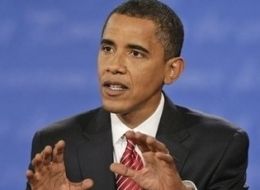


0 Comments:
Post a Comment
Subscribe to Post Comments [Atom]
<< Home